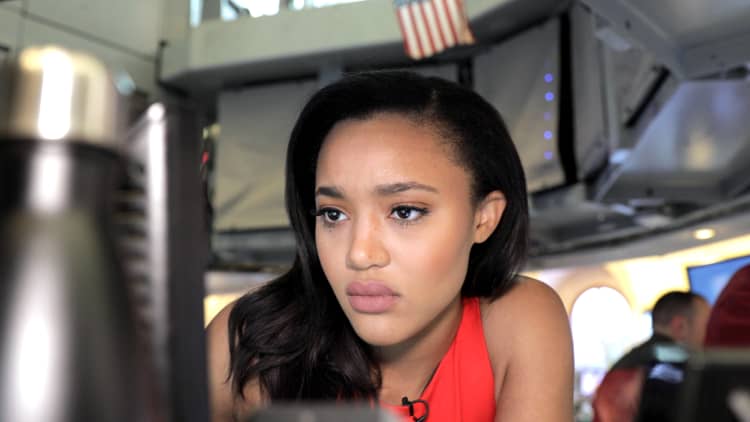It's a rainy Wednesday on the night of the Women's Sports Foundation's Annual Salute and Megan Rapinoe, midfielder for the U.S. Women's National Team, is about to win an award for being the 2019 Team Sportswoman of the Year.
The player is currently in the training for the 2020 Summer Olympics and is also involved in highly-publicized negotiations with the U.S. Soccer Federation. She is also being constantly pulled for photos and interviews.
From the outside, all the activity and attention seem exhausting.
"The attention's not exhausting," she says. "The logistics of it all is exhausting."
To be sure, few athletes have schedules as packed as Rapinoe. This year, the 2019 FIFA best women's player award-winner helped the United States clinch a record-breaking fourth World Cup championship and co-founded a business — all while leading her team through their lawsuit against the USSF for gender discrimination and unequal pay.
According to the lawsuit, if the men's and women's teams won each of the 20 non-tournament games they are contractually required to play, women's team players would earn a maximum of $99,000 ($4,950 per game), while men's team players would earn $263,320 ($13,166 per game).
Balancing her commitments on and off the field is an imperfect art, she admits.
"In order for me to be my absolute best [in soccer], I have to not do anything else," she tells CNBC Make It. "But in order for me to capitalize on everything that I'm doing on the field, I have to be pulled away from what I'm doing."
But Rapinoe says this balancing act is part and parcel of being a female athlete.
"It's what female athletes do. We have to do everything," she says. "Not only do we have to do everything you need for our sport, we have to maximize everything financially outside of our sport, which takes days and time and flights. And then there's the advocacy part."
This balancing act is something many women can relate to. In the United States, women work longer hours of unpaid labor, doing tasks like cleaning, child care and taking care of sick family members, compared to men. When you add both paid and unpaid work together, women work longer hours and still must spend time and energy advocating for themselves.
Economists estimate that the U.S. gender pay gap — the gap between the median salaries of all working men and women in the U.S. — is about 80 cents earned by women for every dollar earned by a man. For black, Latina and Native American women, this gap is even wider.
Rapinoe's advice to women who are working on balancing it all while advocating and negotiating for themselves is simple: "Do not back down," she says. "You're probably going against your employer or your boss and it can be very daunting, but believe in yourself and believe in what you're doing and just don't back down."
When you do face challenges, Rapinoe suggests finding a group of peers you can rely on for support.
"It's hard sometimes, but seek out other women or networks to boost your confidence," she explains. "We're really lucky being on a team; we have 23 other women. If ever you're feeling a wavering moment, everyone's like 'We've got this!' We're lucky in that sense.
"But yeah, just never back down."
As for the USWNT's negotiations, the team isn't showing signs of backing down either. In August, mediation talks between the USWNT and the USSF fell apart, and the case is scheduled to go to trial on May 5, 2020, if a resolution is not found.
Rapinoe says she hopes the two groups can come to a settlement before then. "I don't think a really public trial is in their best interest for sure, but hopefully not ours," she says. "It's gonna take a lot of time and energy on everyone's part to go through a whole public trial."
If Rapinoe's current balancing act is any evidence, it seems she is prepared to give her time and energy to the cause.
"Hopefully it ends in something that both sides feel good about," she says.
Like this story? Subscribe to CNBC Make It on YouTube!
Don't miss:



